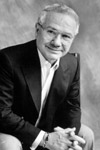2005 – Elliot W. Eisner
School districts around the nation are struggling to decide whether or not to continue funding arts education programs. Educator Elliot W. Eisner states that there really is no choice; cutting those programs will significantly hinder student development.
In his book “The Arts and the Creation of Mind,” Eisner states that including the arts in the curriculum is critically important to the development of thinking skills and a better understanding of the world. The work has earned Eisner, Lee Jacks professor of education and professor of art at Stanford University, the 2005 University of Louisville Grawemeyer Award in Education. The $200,000 award is one of the largest in the field of education.
Eisner disagrees with those who believe that the arts are secondary to education’s core curriculum and not intellectually demanding. He argues that the arts help students develop and refine different styles of thinking, which helps them confront ambiguities in life better than curricula focused on single correct answers.
Eisner says that schools rely heavily on standardized testing, which leads to uniformity among students while neglecting the concept of developing students to their fullest potential. He believes art teaches that variability in understanding is a natural consequence of learning and that not all situations have one right or wrong response.
Eisner says arts programs should follow five principles to enhance students’ overall academic achievement. Those principles include fostering the growth of artistic intelligence, learning how to create satisfying visual images and understand art’s place in culture, and helping students recognize what is personal, distinctive and unique about themselves and their work.
About Elliot W. Eisner
Elliot W. Eisner, Lee Jacks professor of education and professor of art at Stanford University, has been a champion of arts education throughout his career.
Eisner earned his bachelor’s degree in art and education from Roosevelt University in Chicago in 1954, a master’s degree in art education from the Institute of Design at the Illinois Institute of Technology in 1955 and a master’s degree and doctoral degree in education from the University of Chicago in 1958 and 1962, respectively.
He began his career in 1956 as an art teacher at Carl Schurz High School in Chicago. In 1958, he taught art at the University of Chicago’s Laboratory School. After spending one year as an art education instructor at The Ohio State University, Eisner returned to the University of Chicago as an education instructor in 1961; the following year he was promoted to assistant professor of education. He left Chicago for Stanford University in 1965, where he has served as both associate professor and professor of art and education for nearly 40 years. He was named Lee Jacks professor of education and professor of art in 2000.
Eisner has written extensively on imagination and education and has authored books such as “Educating Artistic Vision,” “Cognition and Curriculum: A Basis for Deciding What to Teach,” “The Kind of Schools We Need” and “The Enlightened Eye: Qualitative Inquiry and the Enhancement of Educational Practice.” His books have been translated for publication in Japan, Spain, China, Argentina and South Korea, among other countries.
He has received many honors for his work. His book “The Art of Educational Evaluation: A Personal View” received the 1987 Critics Choice Award from the American Educational Studies Association. Another of his books, “The Educational Imagination: On the Design and Evaluation of School Programs,” was selected as one of several “Books of the Century” in 2000 by The Museum of Education at the University of South Carolina.
In addition, Eisner received the 1989 Edwin Ziegfield Award from the United States Society for Education through Art and the 2004 Brock International Prize in Education. He was elected to The Royal Norwegian Society of Sciences and Letters in 1991 and to the National Academy of Education in 1996.
Eisner has served on the editorial boards of many educational journals.
He also has been active in the American Educational Research Association, serving as its president in 1992-93 and for several years as co-director of the AERA Institute on Arts-Based Educational Research. A former president of the National Art Education Association, the John Dewey Society and the International Society for Education through Art, he is a former member of the advisory board of the J. Paul Getty Center for Education in the Arts.


